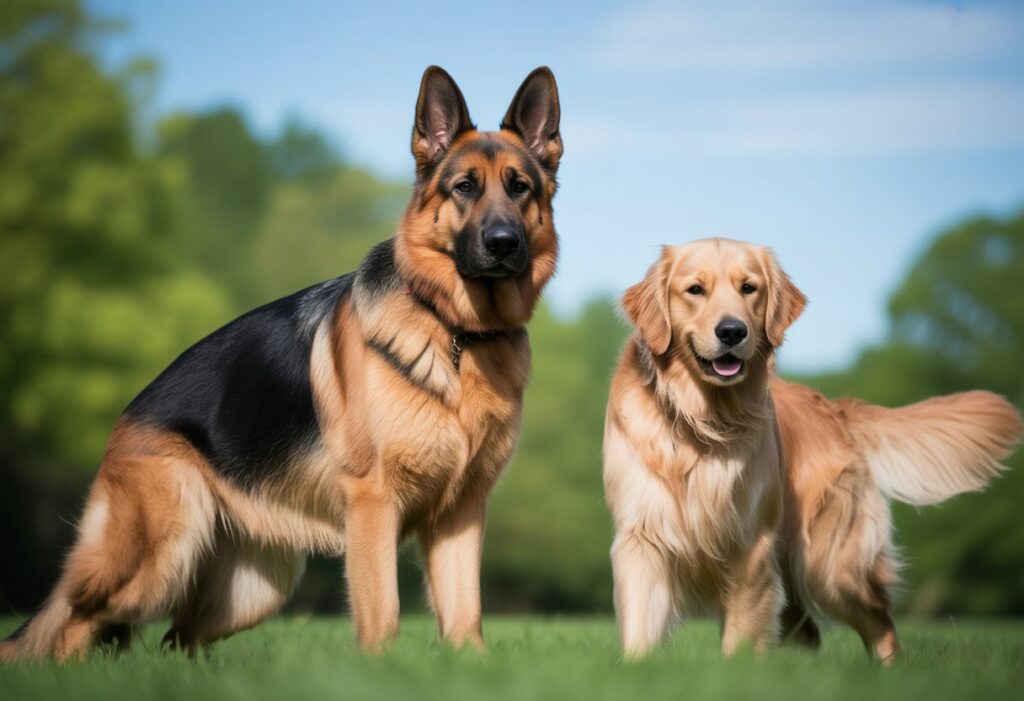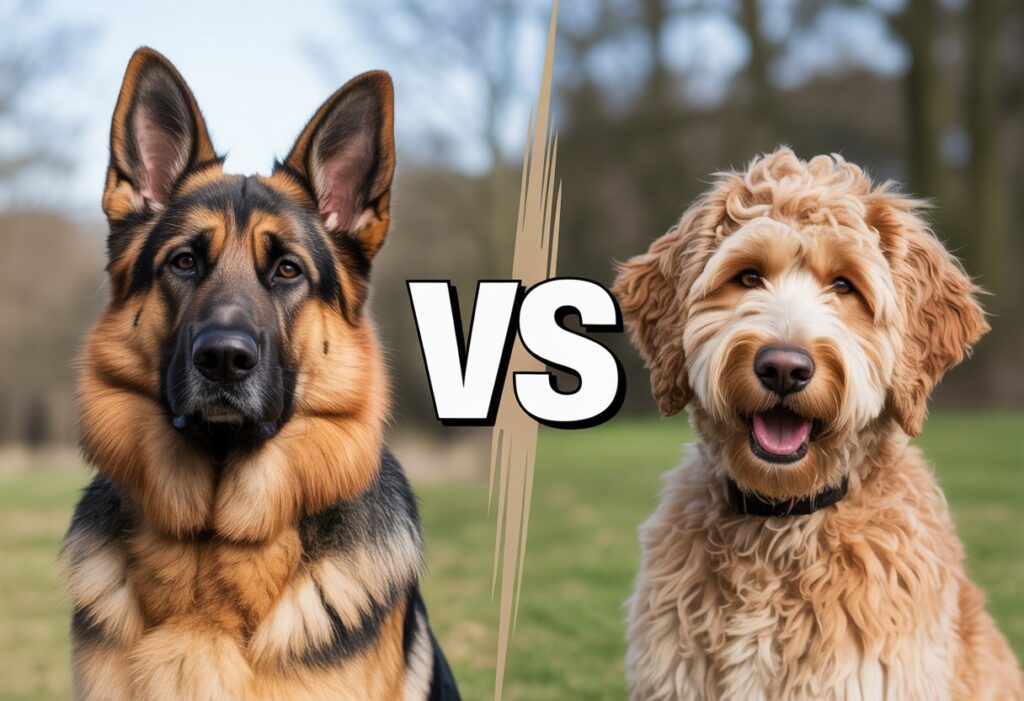Picking the right dog for your home is a big deal, especially when you’re stuck between a German Shepherd and a Golden Retriever.
Both breeds are favorites for families, but they come with different personalities, needs, and strengths. Knowing how these dogs compare can make your decision a lot easier.
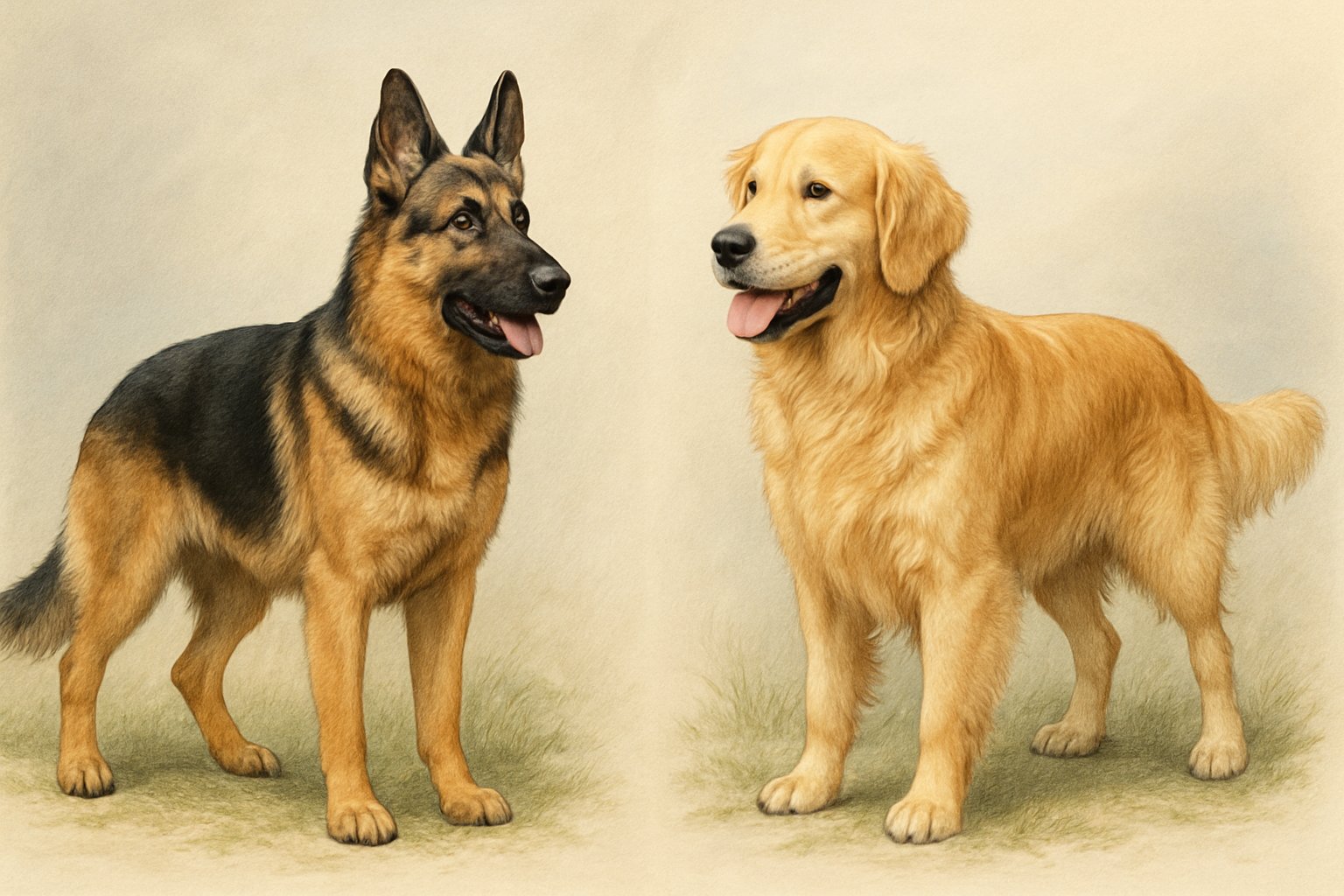
Maybe you want a loyal protector, or maybe you’re after a friendly, easygoing companion.
German Shepherds and Golden Retrievers each bring something unique, from their looks to their daily habits. Learning about their differences really takes the guesswork out of picking the right dog.
Key Takeaways
- Each breed comes with its own history and physical traits.
- Their temperament and health needs aren’t the same.
- Care requirements and lifestyle fit can help you decide.
Breed Origins and Genetics
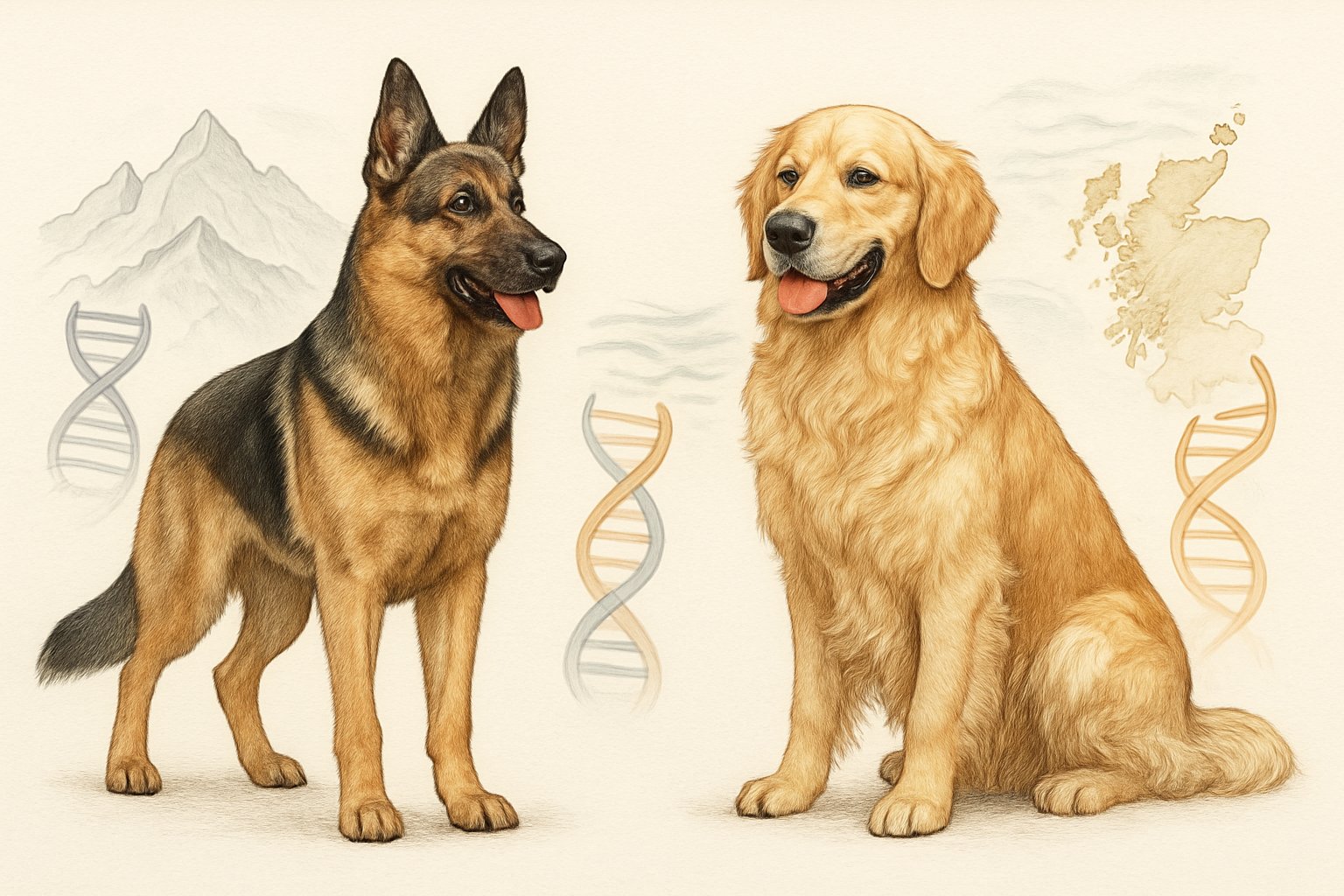
German Shepherds and Golden Retrievers have pretty different backgrounds and genetic quirks.
Their histories and DNA shape how they look, how they act, and even what health problems might pop up.
History of the German Shepherd
The German Shepherd got its start in Germany in the late 1800s. People bred them to herd and protect sheep, so brains and trainability were always a priority.
Max von Stephanitz is the guy who really shaped the breed. He wanted a strong, athletic, loyal working dog.
Over the years, German Shepherds became popular for police, military, and service work because of their skills and focus.
The American Kennel Club (AKC) registered the German Shepherd in 1908. Now, you’ll find them everywhere.
History of the Golden Retriever
Golden Retrievers first showed up in Scotland in the mid-1800s. Lord Tweedmouth wanted a great hunting companion, so he crossed retrievers with water spaniels.
He aimed for a dog that could fetch game from water and land, but still be gentle and easy to train. Goldens quickly earned a reputation for their friendly nature and love for people.
The AKC registered them in 1925. These days, you’ll spot Goldens as therapy dogs, family pets, and competing in obedience events.
Genetic Differences
German Shepherds and Golden Retrievers have their own genetic backgrounds, which affect how they look and what health issues they might face.
German Shepherds are usually bigger, with an angular body, straight back, and a double coat that sheds all year.
Golden Retrievers have a solid, more square build, a water-resistant coat, and—no surprise—a golden color.
Check out some of the more common genetic health issues:
| Breed | Common Genetic Issues |
|---|---|
| German Shepherd | Hip dysplasia, elbow dysplasia, degenerative myelopathy |
| Golden Retriever | Hip dysplasia, certain cancers, heart problems |
Both breeds are smart, but German Shepherds carry more genes for work drive and focus.
Golden Retrievers are more likely to have genes for friendliness and social ease.
You can get genetic testing for both breeds. That’s a good way to spot inherited health problems early and plan ahead.
Physical Characteristics and Appearance
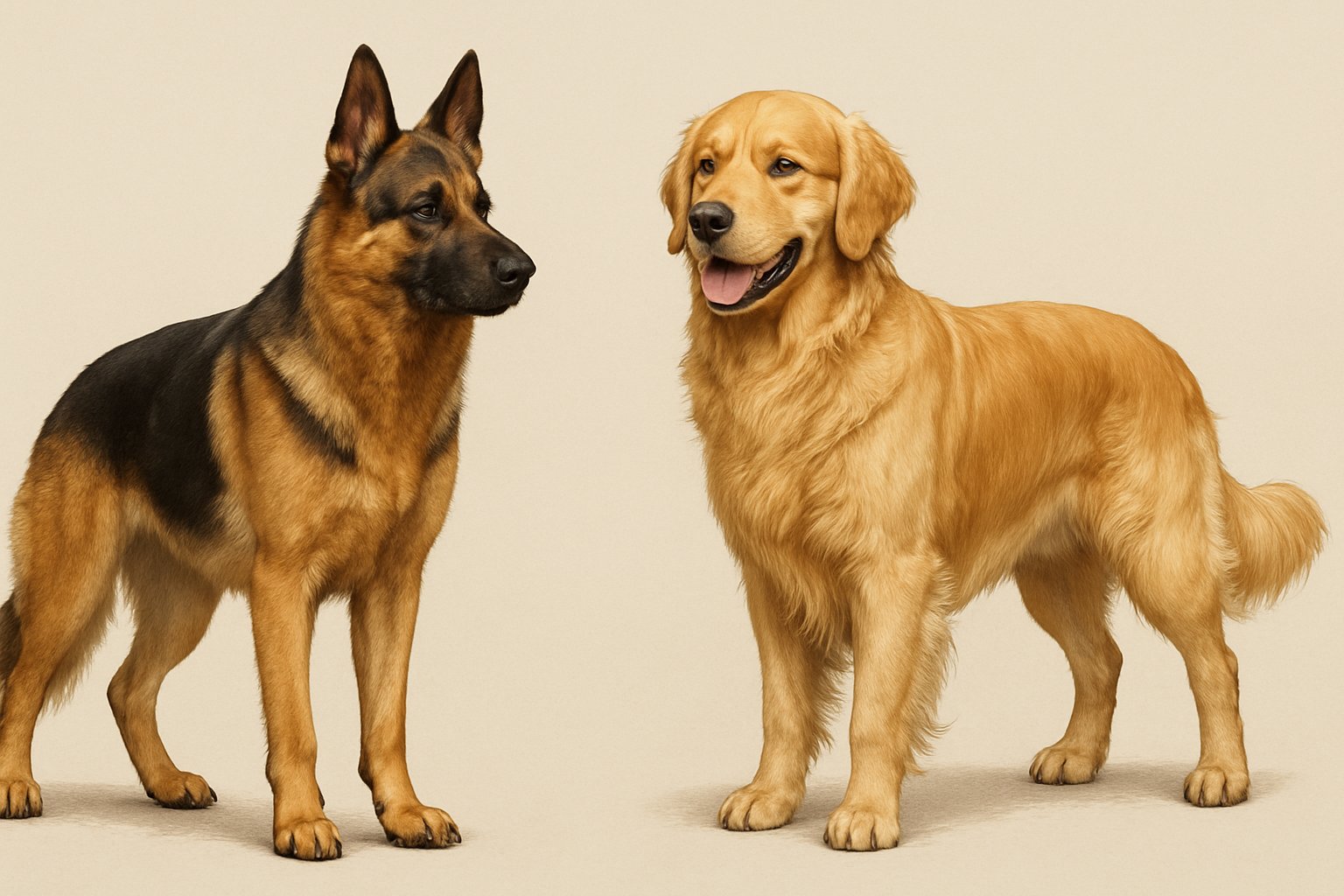
German Shepherds and Golden Retrievers definitely don’t look the same.
Their body shapes, coats, and features really set them apart. Knowing these details helps with care, too.
Size and Build Comparison
German Shepherds have a sturdy, athletic build that stands out. Adult males usually weigh 65–90 pounds and stand 24–26 inches tall at the shoulder.
Females are a bit smaller, at 50–70 pounds and 22–24 inches tall. Their bodies are longer than tall, with strong muscles and a straight or sloped back.
Golden Retrievers are also medium to large, but they look more balanced and approachable. Males usually weigh 65–75 pounds and stand 23–24 inches tall.
Females weigh 55–65 pounds and stand 21.5–22.5 inches tall. Their bodies are sturdy, less angular, with a straight back and a softer overall shape.
Here’s a quick comparison:
| Breed | Weight (Male) | Height (Male) | Weight (Female) | Height (Female) |
|---|---|---|---|---|
| German Shepherd | 65–90 lbs | 24–26 in | 50–70 lbs | 22–24 in |
| Golden Retriever | 65–75 lbs | 23–24 in | 55–65 lbs | 21.5–22.5 in |
Coat Types and Colors
German Shepherds have a double coat: a dense, weather-resistant outer layer and a soft undercoat. Most have medium-length hair, though some are longer.
Colors range from black and tan to sable, solid black, and sometimes black and silver.
Golden Retrievers sport a thick, water-repellent double coat. Their fur is longer, wavy or straight.
The color falls anywhere from light golden to deep gold. Some have feathering on their legs, chest, and tail, which gives them that fluffy look.
Both breeds shed a lot, especially when seasons change. Regular brushing is a must if you want to keep the hair under control.
Distinctive Traits
German Shepherds have those alert, upright ears and bushy tails. Their eyes are almond-shaped and dark, giving them a sharp, intelligent vibe.
The muzzle is long and strong, often with a darker “mask” on the face.
Golden Retrievers have warm, expressive eyes—medium to large and dark brown. Their ears are floppy and close to the cheek.
They’ve got broad heads, straight muzzles, and a gentle expression. Their tails are thick, feathered, and usually carried level with the back or just a bit up.
A few other features:
- German Shepherd: Deep chest, well-angulated rear legs, and a sloped topline in some show lines.
- Golden Retriever: Muscular neck, straight topline, and well-feathered legs and tail.
You can usually spot the difference at a glance—face, ears, and tail give it away.
Temperament and Intelligence
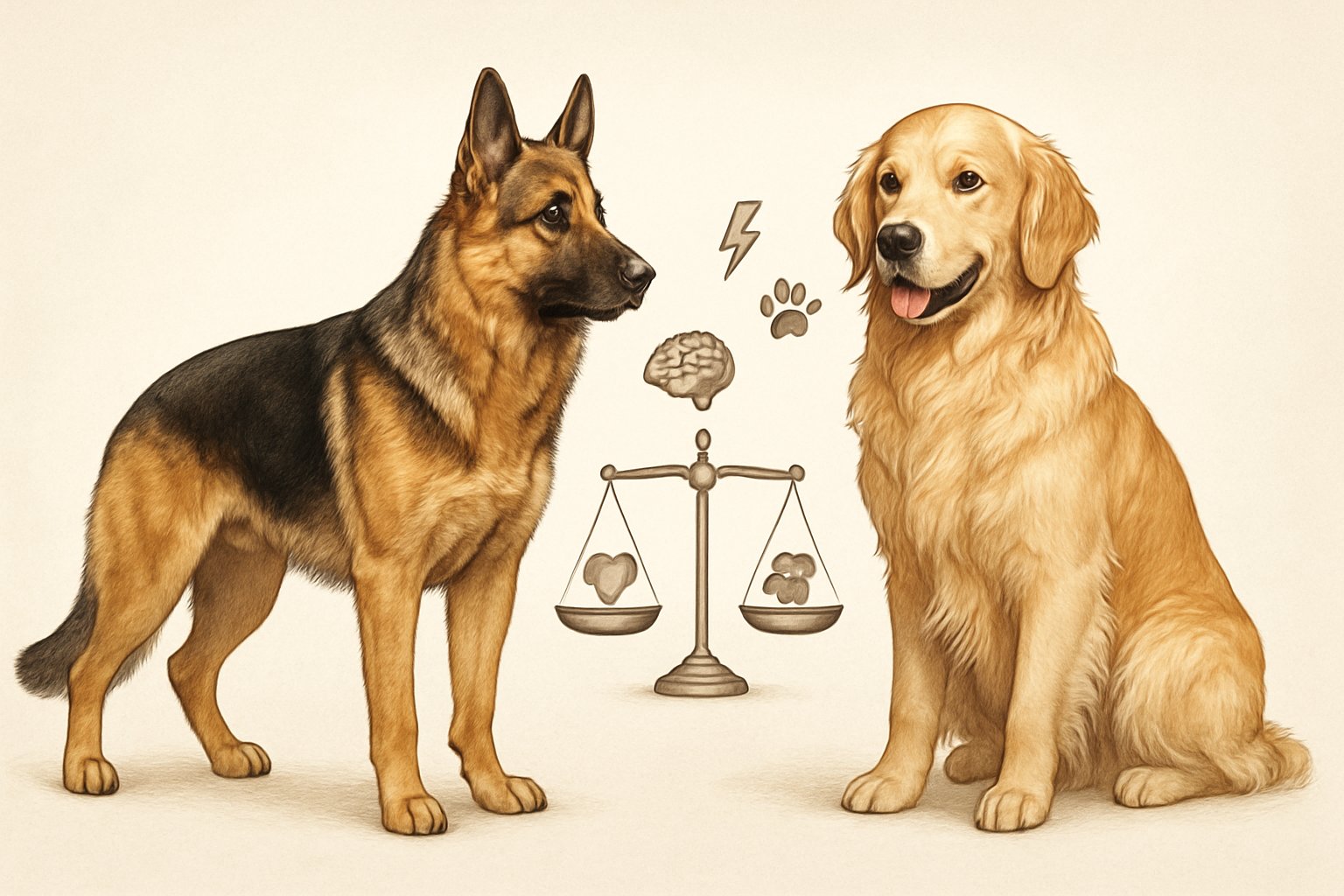
Both German Shepherds and Golden Retrievers are famous for being smart and loyal.
They’ve got their own personalities, problem-solving styles, and ways of fitting into family life.
General Personality Traits
German Shepherds are alert, brave, and fiercely loyal. They’re protective and might act cautious around strangers.
You’ll find that they form strong bonds with their people.
Golden Retrievers are the classic friendly, patient, eager-to-please type. They’re gentle and get along with just about everyone.
Goldens tend to be less wary of strangers than German Shepherds.
Key Differences:
| Trait | German Shepherd | Golden Retriever |
|---|---|---|
| Friendliness | Moderate | High |
| Cautiousness | High | Low |
| Loyalty | Very High | High |
Intelligence and Trainability
Both breeds are smart and quick to learn. German Shepherds often shine in police, military, and service jobs.
They pick up complex tasks fast and like having something to do.
Golden Retrievers also train easily and want to make their owners happy. They do well in obedience classes and make excellent therapy and assistance dogs.
Stick to positive reinforcement—praise and treats work wonders. Training sessions should be short and fun.
Key training tips:
- Start early
- Use positive rewards
- Keep it short and fun
- Patience goes a long way
German Shepherds might need more mental challenges to stay out of trouble.
Socialization and Compatibility
Start socializing both breeds early to help them grow into well-rounded adults.
German Shepherds can be protective, so introduce them to new people, pets, and places while they’re young.
Golden Retrievers are usually friendly, but early socialization helps them avoid shyness. They’re great with other dogs and kids, making them solid family pets.
For families:
- Goldens are usually relaxed with visitors
- German Shepherds need careful introductions to new pets or little kids
- Both breeds need daily interaction and activities
Health and Lifespan
German Shepherds and Golden Retrievers can both face genetic health problems that affect their quality of life.
Regular vet visits and good care matter a lot if you want them around for years.
Common Health Issues
German Shepherds often deal with hip and elbow dysplasia. These joint problems can cause pain or make walking tough.
They’re also at risk for degenerative myelopathy (a nerve disease) and bloat, which is a dangerous stomach issue.
Golden Retrievers have a higher risk of cancer, especially lymphosarcoma and hemangiosarcoma. They can also get hip dysplasia, skin problems, and heart issues like subvalvular aortic stenosis.
Both breeds can have allergies, eye issues, and ear infections. Early health screenings and finding a good breeder who tests for genetic problems can help.
A healthy diet, exercise, and keeping your dog at a good weight make a difference.
Here’s a quick comparison:
| Health Issue | German Shepherd | Golden Retriever |
|---|---|---|
| Hip Dysplasia | Common | Common |
| Cancer | Less common | More common |
| Bloat | Common | Less common |
| Allergies | Sometimes | Sometimes |
| Heart Issues | Rare | Sometimes |
Lifespan Expectations
German Shepherds usually live 9 to 13 years. Genetics, diet, environment, and vet care all play a role.
Golden Retrievers tend to live 10 to 12 years. With good care, some beat the odds, but cancer rates can cut their lives short.
Routine checkups and catching problems early help your dog stick around longer. Preventive care—like vaccines, dental cleanings, and regular exercise—makes a difference.
Here’s what to expect:
- German Shepherd: 9–13 years
- Golden Retriever: 10–12 years
Picking a puppy from healthy parents can up your chances of a longer, healthier life for your dog.
Care Requirements and Lifestyle Fit
German Shepherds and Golden Retrievers have different care needs, energy levels, and grooming routines.
Knowing these details can help you figure out which breed fits your life.
Exercise and Activity Needs
German Shepherds need a lot of exercise every day. They’re active and really want a job or purpose.
Aim for at least one to two hours of activity—running, walking, or playing fetch.
Golden Retrievers love daily exercise, too. Long walks, swimming, and fetch are all hits.
If they get bored or don’t get enough activity, both breeds can pick up bad habits. Living in a small space or having a packed schedule can make it tough to meet their needs.
A yard helps, but daily time for exercise is important for both.
Grooming and Maintenance
German Shepherds shed a lot, especially in spring and fall. Their double coat needs brushing several times a week to get rid of loose fur.
They only need a bath when they’re actually dirty. No need to overdo it.
Golden Retrievers have a thick double coat too, but their fur is longer and tangles more easily. You’ll want to brush them every day, or at least every other day, to prevent mats and keep their coat looking good.
Both breeds need regular ear checks. Trim their nails, and don’t forget about dental care.
Honestly, routine grooming matters if you want them comfortable—and if you don’t want hair taking over your house.
Ideal Family Environments
German Shepherds are loyal and protective. They really click with active families and make solid guard dogs.
They might act cautious around strangers at first. But once they trust you, they bond fast.
Golden Retrievers? They’re friendly and gentle. Most of them have a ton of patience with kids and make great family pets.
They usually get along with everyone, even other animals. It’s honestly hard not to love their easygoing vibe.
Both breeds want to be included in family life. Leaving them alone for long stretches isn’t a good idea.
If you’ve got small kids or other pets, Golden Retrievers are often easier to manage. German Shepherds, on the other hand, might need a bit of training to help them chill out in a busy home.

